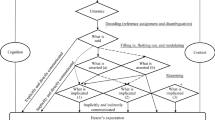Abstract
In this paper, we put forward a position we call “situationalism” (or “situated minimalism”), which is a middle-ground view between minimalism and contextualism in recent philosophy of language. We focus on the notion of free enrichment, which first arose within contextualism as underlying the claim that what is said is typically enriched relative to the logical form of the uttered sentence. However, minimalism also acknowledges some process of pragmatic intrusion in its claim that what is thought and communicated is typically enriched relative to what is said. We show that situationalism dispenses with free enrichment both at the level of what is said (proposition expressed) and of what is thought (mental level). According to situationalism, an alleged underdetermined utterance can, pace minimalism, be true in one situation while false in another, and two people using the same alleged underdetermined sentence can be characterized, pace contextualism, as having said the same thing.
Similar content being viewed by others
References
Bach K. (1994) Conversational implicitures. Mind and Language 9: 124–162
Bach K. (1999) The myth of conventional implicature. Linguistics and Philosophy 22(4): 327–366
Bach K. (2001) You don’t say?. Synthese 128(1–2): 15–44
Barwise J., Perry J. (1983) Situations and attitudes. MIT Press, Cambridge, MA
Bezuidenhout A. (2002) Truth-conditional pragmatics. Philosophical Perspectives 16: 105–134
Borg E. (2004) Minimal semantics. Oxford University Press, Oxford
Cappelen H., Lepore E. (2005) Insensitive semantics. Blackwell, Oxford
Carruthers P. (2006) The architecture of mind. Oxford University Press, Oxford
Carston R. (2002) Thoughts and utterances: The pragmatics of explicit communication. Blackwell, Oxford
Corazza E. (2004) Reflecting the mind: Indexicality and quasi-indexicality. Oxford University Press, Oxford
Corazza E. (2007) Contextualism, minimalism, and situationalism. Pragmatics and Cognition 15(1): 115–137
Corazza E., Dokic J. (2007) Sense and insensitivity: Or where minimalism meets contextualism. In: Preyer G., Peter G. (eds) Context-sensitivity and semantic minimalism: Essays in semantics and pragmatics. Oxford University Press, Oxford, pp 169–193
Dokic J. (2006) From linguistic contextualism to situated cognition: The case of ad hoc concepts. Philosophical Psychology 19: 309–328
Fodor J. (2001) Language, thought and compositionality. Mind and Language 16(1): 1–15
Gallagher S. (2005) How the body shapes the mind. Clarendon Press, Oxford
Korta K., Perry J. (2007) Radical minimalism, moderate contextualism. In: Preyer G., Peter G. (eds) Context-sensitivity and semantic minimalism: Essays in semantics and pragmatics. Oxford University Press, Oxford, pp 94–111
Larson R., Segal G. (1995) Knowledge of meaning. MIT Press, Cambridge, MA
Leslie S.-J. (2007) Moderate sensitive semantics. In: Preyer G., Peter G. (eds) Context-sensitivity and semantic minimalism: Essays in semantics and pragmatics. Oxford University Press, Oxford, pp 133–168
Martinez-Manrique F., Vicente A. (2009) On the psychological reality of minimal propositions. In: De Brabanter P., Kissine M. (eds) Utterance interpretation and cognitive models. Emerald, London, pp 1–25
Perry, J. (1986). Thoughts without representation. Proceedings of the Aristotelian Society, 60, 137–152. Reprinted in Perry, J. (2000). The problem of the essential indexical and other essays (pp. 171–188). Palo Alto, CA: CSLI Publications.
Perry J. (2001) Reference and reflexivity. CSLI Publications, Palo Alto, CA
Perry J. (2007) Situating semantics: A response. In: O’Rourke M., Washington C. (eds) Situating semantics: Essays on the philosophy of John Perry. MIT Press, Cambridge, MA, pp 507–575
Predelli S. (2005) Contexts. Oxford University Press, Oxford
Recanati F. (1993) Direct reference. Blackwell, Oxford
Recanati F. (2002) Unarticulated constituents. Linguistics and Philosophy 25: 299–345
Recanati F. (2004) Literal meaning. Cambridge University Press, Cambridge
Recanati F. (2007) Perspectival thoughts. Oxford University Press, Oxford
Searle J. (1978) Literal meaning. Erkenntnis 13: 207–224
Soames S. (2005) Naming and asserting. In: Gendler Szabo Z. (eds) Semantics versus pragmatics. Oxford University Press, Oxford, pp 356–382
Sperber D., Wilson D. (1986) Relevance: Communication and cognition. Blackwell, Oxford
Sperber D., Wilson D. (1998) The mapping between the mental and the public lexicon. In: Carruthers P., Boucher J. (eds) Language and thought. Cambridge University Press, Cambridge
Sperber D., Wilson D. (2002) Pragmatics, modularity and mind-reading. Mind and Language 17(1–2): 3–23
Taylor K. (2007) A little sensitivity goes a long way. In: Preyer G., Peter G. (eds) Context-sensitivity and semantic minimalism: Essays in semantics and pragmatics. Oxford University Press, Oxford, pp 63–93
Travis C. (1985) On what is strictly speaking true. Canadian Journal of Philosophy 15: 187–229
Author information
Authors and Affiliations
Corresponding author
Rights and permissions
About this article
Cite this article
Corazza, E., Dokic, J. Situated minimalism versus free enrichment. Synthese 184, 179–198 (2012). https://doi.org/10.1007/s11229-010-9731-5
Received:
Accepted:
Published:
Issue Date:
DOI: https://doi.org/10.1007/s11229-010-9731-5




